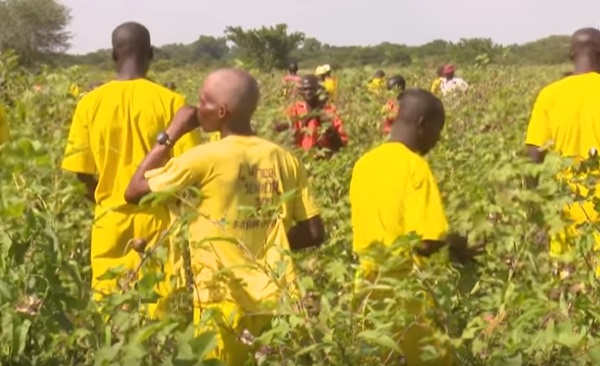Ragem Prison in West Nile Region of North-Western Uganda Is one of the major Prison farms of the fifty-five spread across Uganda. This Prison has about 500 inmates, the total farm acreage 800 acres and 400 used for cotton growing. Coffee and cotton were Uganda’s traditional exports on which the country heavily relied on for foreign exchange. But following the collapse of Co-operative Farmer Societies, many farmers abandoned cotton growing. “The local farmers opted for quick yield and quick money minting crops.” Said, Frank Baine – Spokesperson, Uganda Prisons.
On 12th May 2016, President Yoweri Museveni ordered the Uganda Prison Service to increase the cotton production to make more raw material available to stop the importation of second-hand clothes and promote the local textile industry. “He quickly noticed that Prisons as an institution of the government has such a big chunk of land, has labor and capacity to help resuscitate those factories that were majoring cotton products.” The Uganda Prison Service Spokesman Frank Baine said the institution had the capacity to supply up to 80% of the quantity of cotton needed in Ginneries across the country. “We are projecting that by the end of next year we should be comfortably producing about 6,700 bails.” Baine urged Ugandans to consider growing cotton and take advantage of the prevailing high prices. “The average price now of cotton is 1,680 that’s a good price and fortunately this time around is not like then where this cotton would be removed and they would separate. But this one is taken wholesale.”
Ragem Prison Farm also served as decongestion and skilling farm for inmates from other Prisons. “In the process of producing this cotton, prisoners are participative and they are educated on what to do, at what stage, how to do it and the endpoint. And we hope that when these people go back, they will actually join the struggle to produce for the industries.” “I used to dig cotton at our village but I don’t have experience for digging it there but this year I learnt a lot of things here.” The Officer In-charge of Ragem Prison Assistant Superintendent of Prison Emmanuel Niwagaba said the inmates here not only learnt the skills but also earned from their labor on the farm. “Today, a prisoner goes out to work, he earns; the unskilled earn 100 shillings, the semi-skilled; those who have some developed skills they get 250 shillings then the skilled ones get 500 shillings. That money also helps them as they are here, they can use it for buying a few things they need then the balance is given to them as they are being released.”
The Uganda Prison Service required 350 billion shillings to run Prisons annually to run Prisons across the country which had about 53,000 inmates and 9,000 members of staff in 253 Prison Units. The annual Prisons Budget was 158 billion shillings leaving a deficit of about 55%. This is partly covered by the non-taxable revenue generated from the various projects the Prisons Service runs across the country.

